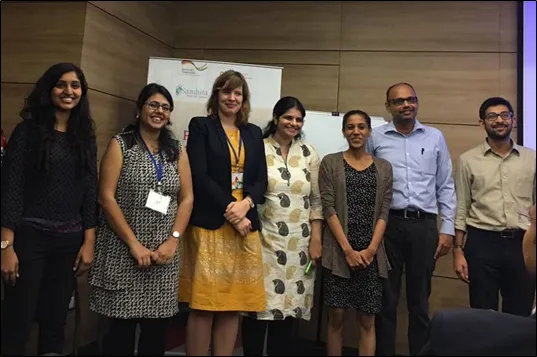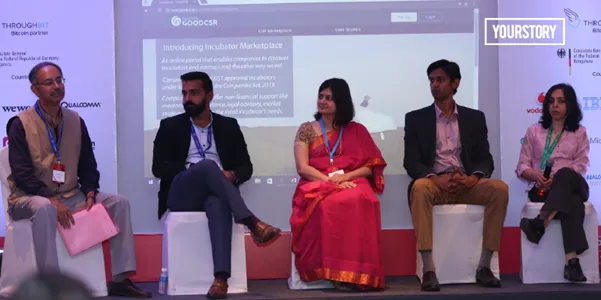This online marketplace connects CSR initiatives, incubators and startups – Anil Misquith, Samhita Social Ventures
Tech trends and recent government policy initiatives bode well for the startup sector - they can focus more talent and capital to scale up solutions to India’s pressing social problems.

(This article is part of the YourStory series Startup Hatch, about incubators, accelerators and makerspaces in the startup ecosystem. See earlier profiles of initiatives at IIT Bombay, IIM Bangalore, BITS Pilani, NCL, Tata Elxsi, Axilor, NID, IIIT-Bangalore, IIIT-Hyderabad, Vellore Institute of Technology, PSG Coimbatore, Workbench Projects, Makers Asylum, Appy Hours, Turning Ideas, NetApp Excellerator, Pitney Bowes Startup Accelerator, Ashoka Innovators, and Startup Leadership Programme.)
Anil Misquith worked in the IT industry for over 25 years before he decided to follow his passion and move to the social sector. He now works with the leadership at Samhita Social Ventures, and is a member of the Board of Trustees of Collective Good Foundation (supported by N.S. Raghavan). He helps chalk out growth strategies and partnerships for companies within the social sector ecosystem. In his free time, he also mentors social sector startups.
Anil joins us in this interview on how corporate CSR investment into incubators can help more startups and social enterprises, and what role the online marketplace model can play in connecting corporates to incubators.
YourStory: What was the founding vision of your Incubator Marketplace, and how is it supported?
Anil Misquith: According to data from the Ministry of Corporate Affairs, Rs 4,719 crore were spent on 11,597 CSR projects in 2016-17. As per Schedule 7 of the Companies Act, 2013, companies are allowed to contribute to, or fund technology incubators within academic institutions approved by the Central Government. Despite that, there were few such partnerships.
Seeing this as an opportunity, Samhita and social enterprise incubator Villgro, along with German sustainable development agency GIZ began facilitating partnerships between companies and incubators across the country.
Through the course of the year, the project evolved in many ways, and we wanted to create a sustainable solution that would continue to keep the momentum of such partnerships going in the future. We chose to host the platform on our GoodCSR marketplace. We felt it was a natural extension of the work we were doing to ease CSR and increase impact.

YS: Which companies and incubators are members today? What partnerships have been struck?
AM: We have currently on-boarded approximately 20 companies and 40 incubators. These are companies that showed interest in supporting incubators, or were collaborating with them, as part of our offline efforts. Similarly, most of the incubators that have come on board are those we engaged through the duration of the project with Villgro’s support.
Our aim with the incubator is to phase out these offline efforts and for the marketplace to be the one-stop solution for companies and incubators to be able to find each other without offline efforts.
Through the period of the GIZ project, we facilitated 17 corporate-incubator partnerships. We are happy to share that the partnerships have been both financial (where there has been financial support to the incubators and the startups) and non-financial (focusing on mentorship support, pro-bono legal support, and so on).
Some of the major companies that have forged partnerships through our initiative are Marico Innovation Foundation, Capital First Limited, Amazon Web Services, Nishith Desai Associates, and Thomson Reuters Foundation.
Here are some of incubators we worked with, and their startups: Zone Startups (Periwinkle Technologies, Tactopus), A-Idea NAARM (Intllo Labs, Yukti Harvest, Jivabhumi, Agricxlab), Startup Oasis (Kaushal Bhaav Skills Solutions, Krimanshi Technologies, Carmel Organics), Villgro (Aindra Systems, Nayam Innovations, Yostra Labs), SIIC (IIT-K), Promorph Solutions, ICRISAT, and Sardar Patel TBI.
YS: What is the profile of the managers of your Incubator Marketplace?
AM: Along with myself, we have Deepak Shandilya and Pranav Gupta. Deepak brings with him over a decade of on-ground experience working with low-income households, and in emerging markets, primarily in Asia. He has cross-sectoral experience in financial inclusion, forestry and environment, livelihood, agriculture, skill development, and water and sanitation. He has worked with large corporations and humanitarian agencies on commercially viable models at the bottom of the pyramid. In Samhita, he is the Head of Business Development for the North Zone.
Prior to Samhita, Pranav Gupta was part of the Young India Fellowship programme, where a Post Graduate Diploma in Liberal Studies exposed him to the many underlying complexities of India’s prevalent social issues. He has also worked at Mu Sigma, an analytics firm in Bengaluru for two years. Pranav holds a Bachelor’s degree in Electronics and Telecommunication Engineering from Symbiosis Institute of Technology, Pune. Pranav is currently Manager Partnerships at Samhita, and is working on projects involving Social Enterprises and WASH.

YS: What would you say are the Top Three opportunities for Indian entrepreneurs?
AM:
- There are many challenges in the social sector, across cause areas such as poor education delivery, lack of rural healthcare, lack of skilling programmes, and waste water management to name a few. These constitute an opportunity for social entrepreneurs to innovate and bring positive change.
- India’s youth have a bigger risk appetite now and are breaking away from traditional career paths. Young talent, including those from the best academic institutes such as IITs and IIMs are willing to work in new startups where they can learn about all aspects of a running a business.
- Indian and foreign investors are making huge investments in startups, which gives them a chance to scale locally and globally.
YS: What are some emerging technology and policy trends in this space?
AM: IT companies’ interest and investment in Artificial Intelligence, Machine learning, Internet of Things and Virtual Reality are trickling down to the nature of technologies being developed on the ground and the manner in which they are being used. These technologies hold the potential to disrupt the way we envision the world, and while existing tech giants such as Google, Intel, Microsoft and others have made inroads, they present great potential for new startups as well.
At the policy level, the Government of India has undertaken several initiatives and instituted policy measures to foster a culture of innovation and entrepreneurship in the country. Startup India, Make in India, Atal Innovation Mission, Digital India, Mudra Yojna, SETU Fund, and other initiatives have increased the ease of doing business, and cut down arduous government regulations and red tape.
State governments are joining this movement as well. A number of them such as Kerala, Andhra Pradesh, Karnataka, and Telangana are actively supporting incubators. Others are speeding startup policies, startup funds and venture capital funds (VCFs). For example, the ‘Scheme for Assistance for Startups/Innovation’ announced by the Industries Commissionerate of Government of Gujarat supports nodal institutions that can assist startups and innovation.
YS: What are the key challenges faced by startups in India, and how can you help bridge the gap?
AM: Access to capital has been one of the major struggles for startups. This leads to the inability to pay for talented resources. While there are many enthusiastic to work and learn in a startup environment, attrition is also high.
Another challenge is the lack of market linkages and expert guidance. Many a time, the focus remains on gaining capital without sufficient importance or time given to establishing relationships and linkages within the market, or finding the right kind of mentor for the organisation.
By forging partnerships between companies and incubators or social enterprises/startups, Samhita has been able to address these challenges. When corporates support incubators, commercially or operationally, it enables them to provide the startups with seed capital or access to further funding opportunities along with other services such as resource sharing, industry insights, and mentorship.
Samhita is also helping startups test their solutions. By enabling partnerships with companies from a business standpoint or on their CSR projects, companies help the capacity building of startups and help scale up their operations.

YS: What are the unique challenges for social entrepreneurs as compared with tech or profit-led enterprises?
AM: While funding and talent gap are the main challenges, some challenges unique to social entrepreneurs are:
- Remaining true to the mission: Not focusing on a good strategy and long-term goals can often lead to an undesirable shift in the social value provided.
- Communicating value objectively: Social value is not easily measured and can be difficult to communicate as part of the bottom line to investors, donors or the community at large.
- Distribution gap: Social enterprises readily supply innovative products, services, or business models, but the path to scale these innovations lacks robustness, efficiency, and navigability. This is largely caused by a lack of demand on the part of key scaling platforms, namely governments and large companies.
YS: What is the selection criteria for participants in your marketplace?
AM: At this stage, there is no selection criteria for registering. Currently, the focus is on building awareness about the marketplace among stakeholders.
But to ensure that quality of partnerships, we have a due diligence process for publishing a programme or responding to a Request for Proposal (RFP) through the platform. We will soon be adding more checks and balances to ensure transparency.
YS: What support and services do marketplace participants receive?
AM: The incubator marketplace enables companies to find the right incubators and enterprises, and vice versa. Companies can browse through the various incubator or startup programmmes that require funding support to see what best matches their organisation’s interest. In addition, they can request proposals from incubators based on project specifications.
Incubators can create profiles, list the startups in their portfolio, and create programmes on the platform that require financial as well as non-financial support for various activities such as accelerator programmes, training and workshops, hackathons and challenges, and seed assistance to startups.
Incubators can identify companies based on their offerings - either financial or non-financial support like mentorship and guidance, legal advisory, infrastructure support, and go-to-market strategy.
Participants in the marketplace also get access to a Knowledge Repository which has case studies demonstrating different successful partnership models between companies and startups as well as companies and incubators.
YS: What fees and IP requirements are charged?
AM: At present, the registration on the marketplace is free. We plan to charge fees for certain services on the platform soon. Decisions on IP related areas will depend on individual partnerships and will be left to their discretion.
YS: What kinds of IP are being created by these partnerships?
We believe that in the initial phases, the IP efforts will primarily be led by individual startups. As partnership develop and mature, there may be opportunities for co-development or technology transfer between entities.
YS: How would you differentiate your Incubator Marketplace from others in the field?
AM: CSR investment in the incubator and startup space is a nascent stage right now.
Samhita and Villgro’s years of experience in the CSR space, social sector and incubator space has allowed us to identify and address the challenges that could and do arise in such partnerships.
Our marketplace is built to support collaborations - incubators can get support from corporate CSR in India through a systematic mechanism. Our model accounts for teething problems that come with new ways of collaboration and partnerships, and provide support through offline efforts to ensure that sustainable long-term partnerships can be forged. In addition, our knowledge repository and other services have provided targeted support for the stakeholders.
Samhita’s knowledge of the CSR sector, and Villgro’s experience with local and international startups, has been instrumental in creating a model that is distinct in its offerings and its approach.
YS: What would you define as success for your marketplace?
AM: As with any startup, our definition of success changes as our project grows and evolves. Our end goal is for the platform to drive successful partnerships that can deliver meaningful impact.
At this time, success for us is to build awareness about the platform. Having incubators and companies organically come on board and engaging with one another is another success marker.
A marker for us internally is to ensure that we are adding value to our partners and building capacity for them.
YS: Do other countries also have such marketplaces? What has been their experience so far?
AM: While there are many online portals for investing in startups such as F6s and Angel.co, we have not come across any marketplace with a special focus on companies and incubators.
Many platforms do not sustain in the long run since they are not capable of generating significant value or they become redundant in the space. That remains a big challenge.
YS: What are your plans for the coming three to five years with respect to new partnerships?
AM: Now that corporate CSR is more evolved and there is increasing awareness and better understanding of how incubators can be supported, we look forward to forging many more partnerships in the next three to five years.
While our project with GIZ has concluded, we see that it has created an impetus in the ecosystem and now we find companies approaching us to explore working with incubators. Along with the incubator marketplace, we will continue in support such partnership programmes.
In the near future we are looking to work closely with social enterprises on CSR programmes. There is an urgent need for innovative, cost effective and high quality sustainable solutions to be deployed and social enterprises often have such solutions. We hope to facilitate partnerships between companies and social enterprises in the near future as well.
YS: How can better partnerships be forged between accelerators, incubators, industry and universities?
AM: A partnership is only valuable as long as there is mutual benefit for the entities involved in it. A shared vision, on the other hand, ensures that all entities align towards a common goal in the long run. Therefore, we believe it was important that each stakeholder understand the value that they and others bring to the table.
In the initial phase itself, this came as a significant challenge. We realised that there was a mismatch of expectations between companies and incubators. They did not understand each other.
By bringing them together through different forums, networking and pitch sessions, meetings and so on, we successfully bridged this gap. Thus, one way to forge better partnerships would be through such industry forums that help in bridging information asymmetry and build awareness within the ecosystem.
YS: What are your recommendations for Indian policymakers to make business easier for incubators, accelerators, investors, researchers and startups in India?
AM: We need policies that will enable startups across sectors - especially agriculture, health, energy, solid and liquid waste management, transportation, and housing.
We need to develop policies that encourage the ecosystem to support startups just like the guidelines issued by the Government to PSUs and Companies to support Swachh Bharat Mission through CSR -- prioritising CSR into startups will help build some momentum. A variant of representative bodies like of FICCI or NASSCOM for startups should be developed to facilitate market linkages, provide access to capital and mentorships. It needs to be kept in mind that startups in smaller cities need a separate level of support, especially with access to capital and market linkages.
Additionally, MHRD policies could have students in colleges (across streams) to intern with startups as part of their field activities in smaller towns and cities just like the medical education system.
Another important avenue is for researchers to be given grants to work with startups and help co-develop their Intellectual property.
YS: What are your recommendations or words of inspiration to the startups and entrepreneurs in our audience?
AM: I would like to call out three areas: ideas, people and processes
- Ideas: I would like to start by quoting Albert Einstein “If you can’t explain it simply, you don’t understand it well” (excerpted from YourStory’s book ‘Proverbs and Quotes for Entrepreneurs’). A deep understanding of the problem that is being attempted to address is critical. This should be followed by validation of the model with the intended customers or beneficiaries at field level.
- People: A core founding team with complementary skill sets and a common vision is an imperative in the early phases to withstand all the challenges that a startup encounters. As startups grow beyond the first set of employees, a good middle management team is required to help the Founders focus on strategic aspects while ensuring the larger teams are guided well and are aligned to the vision of the startup.
- Processes: As organisations begin to prepare for scale, thinking of processes, systems and policies is critical without losing sight of the customers.
In sum, success is about dreaming big and ensuring that one idea gets executed well in the first few years.







